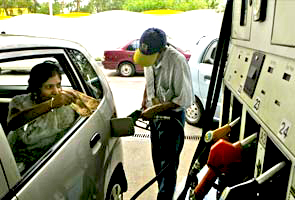
Mumbai, September 24: Consumers may get some relief as oil marketing companies (OMCs) plan to revise petrol prices downward due to falling international crude oil prices and a strengthening rupee.
The Indian basket of crude oil fell to $106.74 on September 20 from $116 five days earlier, according to data published by the oil ministry. The rupee, which hit a four-month-high of 53.47 on September 21, is expected to strengthen further due to the reform measures the government announced last week.
Usually, each dollar fall in crude oil makes petrol cheaper by 33 paise. Similarly, a strengthening rupee would lead to a 77-paisa reduction in the price of petrol. "Logically yes, petrol prices should fall.
However, we have to wait for some more time before deciding to pass on the benefit to consumers," S Varadarajan, director (finance) at BPCL, told TOI. According to him, petrol is being sold at par - no profit, no loss.
The OMCs also plan to effect frequent revisions so that the price change is reflected in paise to soften the blow for consumers and avoid any political backlash. OMCs earlier used to revise petrol prices on the 1st and 16th of every month on the basis of average international oil prices and the foreign exchange rate in the previous fortnight. However, the practice was discontinued in late July in favour of revising rates on a random date to deter petrol pump dealers from building positions.
"In US, petrol prices are revised everyday at 3 pm. In many countries, it is revised on an hourly basis. We are trying to do it more often, maybe on a bi-weekly or weekly basis, so that the revision is in paise and the consumer is not burdened with a steep hike," BPCL chairman R K Singh told TOI. He added that the government has now given OMCs a free hand on deciding the quantum and timing of a petrol price hike.
Petrol was de-controlled in 2010 but the OMCs were not allowed to revise petrol prices. So they used to seek an unofficial nod from the government to pass on a hike to consumers. This led to $1 billion in losses for the OMCs till September 15.
IOC chairman R S Butola said, "The government has taken a bold step in revising diesel price, reducing duties on petrol and capping LPG cylinders to six per household every year. Now our pump prices are at par with petrol's cost, and we'd like to be at par because the loss on petrol is not compensated by the government."
Competition Commission of India (CCI) is reportedly likely to investigate into the alleged cartel-like behavior of OMCs increasing and decreasing prices of petrol in unison. "Petrol is a decontrolled product and we can't afford to make losses on it. We are answerable to our shareholders and the federal auditor," said an HPCL board member.




Comments
Add new comment